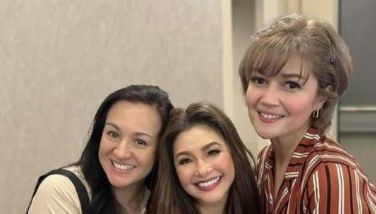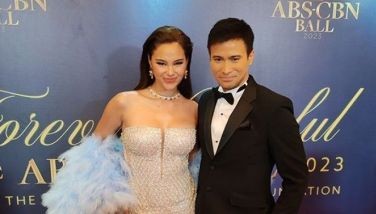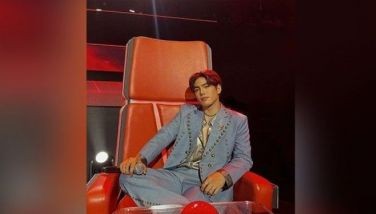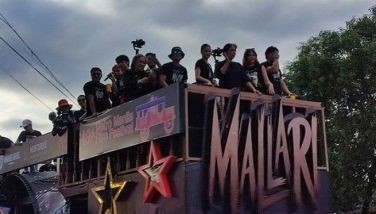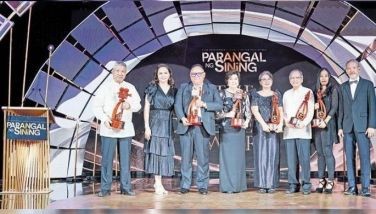Inside Ralph Fiennes
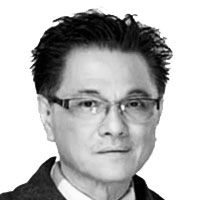
October 27, 2002 | 12:00am
 A film critic put it accurately when he described Ralph Fiennes (pronounced Rafe Fines) thus: With his electrifying gaze, elegant comportment and lips that look as if they could breathe life into concrete, he has caused many a jaded filmgoer to reaffirm the existence of British sex appeal.
A film critic put it accurately when he described Ralph Fiennes (pronounced Rafe Fines) thus: With his electrifying gaze, elegant comportment and lips that look as if they could breathe life into concrete, he has caused many a jaded filmgoer to reaffirm the existence of British sex appeal.
That’s Ralph Fiennes bigger than life on the silver screen.
In the flesh, out of the showbiz spotlight, Fiennes exudes that British "sexiness," all right, but he’s surprisingly self-effacing and refreshingly soft-spoken, a far cry from his awesome screen persona best exemplified in his most famous role as the Nazi sadist Amon Goeth in Schindler’s List which he portrayed with consuming passion and searing intensity.
Facing a dozen journalists from around the world at a function room of the Rihga Royal Hotel in Manhattan during the press junket of Red Dragon, now showing in Metro Manila, Fiennes looked somewhat unbelievably scared – or was it all in my mind? He wore a casual shirt, talking almost in whispers, wearing only a deadpan expression almost throughout the Conversation and very rarely smiling.
The oldest of six children, Fiennes was born in Suffolk, England, on Dec. 22, 1962, to a self-taught photographer father and a novelist-mother who wrote under the pen name Jennifer Lash.
"While we were growing up," revealed Fiennes, "the family moved a number of times. We children were encouraged early on in our creative pursuits."
Besides Fiennes, four other siblings ended up in the entertainment business. His brother Joseph is also an actor, one sister is a director, another sister is a producer and another brother is a musician.
"I originally wanted to be a painter," added Fiennes who enrolled at the Chelsea College of Art and Design, only to transfer to London’s Royal Academy of Dramatic Art to pursue his real calling – acting. After graduation, he joined the Royal National Theater (in 1987) and became part of the Royal Shakespeare Company a year later, performing a whole range of classics, from Romeo in Romeo & Juliet to Edmund in King Lear.
After a head-turning performance as the title role in the British TV production A Dangerous Man: Lawrence After Arabia in 1991, Fiennes the next year had his movie debut playing Healthcliff in Wuthering Heights, opposite the equally brilliant Juliette Binoche. The following year (1993), he did Schindler’s List, earning a Best Supporting Actor Oscar nomination – and international acclaim. He has done several films after that, playing characters that left indelible marks in the public memory.
In Red Dragon, Dino de Laurentiis’ $80-million thriller directed by 32-year-old Brett Ratner (megman of the Jackie Chan smash-hit starrers Rush Hour 1 and 2), Fiennes shines with blinding brilliance as the serial killer Francis Dolarhyde, also known as Tooth Fairy because he loves to bite his victims, creating his own moments apart from those by co-stars Anthony Hopkins (reprising his Dr. Hannibal Lecter role in The Silence of the Lambs and Hannibal) and Edward Norton (as FBI agent Will Graham who captured Hannibal).
Would you consider the Tooth Fairy role as the most gruesome you’ve done so far?
"Probably. Yeah, you’re right."
How do you usually internalize a role, specifically this one?
"I’ve read a lot of stories about psychopath serial killers and they helped me imagine what it would be like to be a serial killer."
I suppose you’ve watched Silence of the Lambs and Hannibal.
"Oh, yeah, I did."
Did they help you play your role in Red Dragon?
"No, not really. I mean, I admire the films very much but when I started work on Red Dragon, I forgot the other films. I wanted to imagine this film as an entirely new one, not a prequel to the other two."
What did you find most scary about the role… about the movie?
"What I found scary was how the role demanded of the actor playing it to bring out his sadistic side. Isn’t it so scary watching a man enjoying, scaring and then humiliating and then killing someone else?"
What was the hard part doing the role… the movie?
"It’s always the same. I get nervous everytime I make a movie. I always think I won’t be able to do it. It’s always that way all the time."
You put yourself 100 percent into every role.
"Yeah. One hundred percent. Always."
In one long sequence in Red Dragon, you’re shown running around naked (his private part dangling as he runs up the stairs). Was it hard to do?
"No. Not at all."
You have a breath-taking tattoo all over your back in the movie. How long did it take the artist to do it?
"They did a model for my back, same size, and it took them seven to eight hours to put it on my back, using special pens. The first time, the tattoo lasted for three days but after that they had to retouch it everday."
Do you have any real tattoo?
"No, I don’t. (Adding with a big smile) If I say ’Yes, I have,’ you will ask me, ‘Where?’ No, I don’t have any tattoo anywhere in my body."
Isn’t it a pity that you didn’t have a scene with Anthony Hopkins?
"I think he’s a great actor. It’s my first time to do a movie with him. I’m very frustrated that I didn’t have any scene with him."
Besides Schindler’s List, what would you consider your most memorable role?
"It’s a hard question to answer. Well, I would say Sunshine where I played three different roles in a saga tracing 150 years of the affairs and intrigues of a family of Hungarian Jews. Working on the movie was a great experience. I learned a lot about acting, about life, and I got the rare chance of playing three different roles. That was a very important piece of work for me."
What kind of roles do you find interesting, challenging?
"I like roles that have some psychological twist. I think it’s the job of the actor to realize a character and to get the audience to be connected to this piece of drama, to find truth in the character you’re portraying. I want the audience to be immersed in the journey and come out of it totally affected by it, whether they’re watching comedy or tragedy."
In Red Dragon, you’re playing the monster. I read somewhere that as a child, you had this mortal fear of monsters and you even had nightmares about them.
"You’re right. But aren’t all kids afraid of monsters? You were afraid of monsters, too, when you were a kid, weren’t you?"
How would you describe your childhood?
"Happy… even if my father and my mother didn’t have enough money. My father was a photographer. Times were difficult then. I was a teenager then and I could feel the strain. It was difficult at that time. I could be, you know, pretty, pretty difficult. I had my moments."
Did you move away from the family early?
"No, I didn’t. In fact, I did it quite late. I was already 21 then."
At what point in your life did you realize you wanted to be an actor?
"When I went to an art college; I thought I wanted to be a painter. I took a one-year art course in England. The purpose of that course was to expose students to different art forms – photography, fashion design, graphic design, fine arts, sculpture. That course freed me up to think what other things I could do. I acted in school. I realized that I didn’t want to be a visual artist, that I wanted to be an actor. So I decided to join an amateur theater group in London and then I went to a drama school. When I left drama school, my first job was in an open-air theater in London."
You love London, obviously.
"I love London, I like London. It’s been my home for 20 years. I’m not a Londoner by birth, but I love London. I also love New York… I love working abroad. I love working around the world."
Which country would you like to go back to?
"Italy. I have filmed in Italy. I like filming in the desert, like I did for The English Patient. I also like Russia."
You’ve been successful in movies but you still go back to theater every now and then. Your heart seems to be in theater.
"I earn more in the movies, that’s true, but the quality of the work and the substance of the role are often greater in the theater. That’s why doing Shakespeare, going through that emotional depth and range, gives me great satisfaction and fulfillment as an artist. Every role, whether in theater or in a movie, is a learning experience for me. You don’t stop learning, you don’t stop growing. In theater, there’s a new audience everyday, so doing the play is like doing it for the first time, over and over again. It feels like the first time everytime."
You’re celebrating your 40th birthday on Dec. 22. Life begins at 40. How does it feel?
"I quite like getting older. I feel more at ease as I grow older."
What gift do you want for your birthday?
"I really don’t want any gift. (Thinks again) Come to think of it, I want peace of mind as a gift."
Why peace of mind?
"I don’t know. Maybe because I worry too much."
What do you usually worry about?
"I can’t say. It’s quite private."
How’s your relationship with your brother Joseph (now in Australia filming the Benjamin Bratt topbiller The Great Raid, with our very own Cesar Montano playing a key role as guerilla leader Pajota)?
"We’re okay. We’re all very close."
No sibling rivalry or professional jealousy maybe?
"I don’t think so. We’re playing different roles. I don’t feel that there should be any competition."
You didn’t start in the business at the same time, did you?
"No, we didn’t. I started earlier. I’m seven years older than him."
How do you, so to speak, put yourself under the skin of the character you’re playing?
"Reading is always my starting point. And then I try to meet professional people and, in the case of my role in Red Dragon, see some people afflicted with the same illness ... in the case of the character Francis Dolarhyde/Tooth Fairy, schizophrenia-related illness. But the bottom line is that you must use a lot of your imagination, always, all the time."
What do you think is the best movie that you’ve seen so far?
"The Mirror by Andrei Tarkovsky. It’s not a commercial film but, like most of Tarkovsky’s works, it’s a great film. (Done in 1975, according to Ephraim Katz’s The Film Encyclopedia, The Mirror was a controversial, autobiographical film which employed an open-ended plot structure and unorthodox cinematic techniques familiar to Western audiences but radically revolutionary as far as Soviet filmgoers were concerned. – RFL) Tarkovsky is a true poet; he turns cinema into poetry. If I were to be stranded in an island, I’d take with me all of Tarkovsky’s films."
What do you think are the major benefits of (your) being an actor?
"Well, I get to do what I love doing, and that’s acting."
And the price that you have to pay?
"Loss of privacy."
BrandSpace Articles
<
>
- Latest
- Trending
Trending
Latest
Trending
Latest
Recommended

















